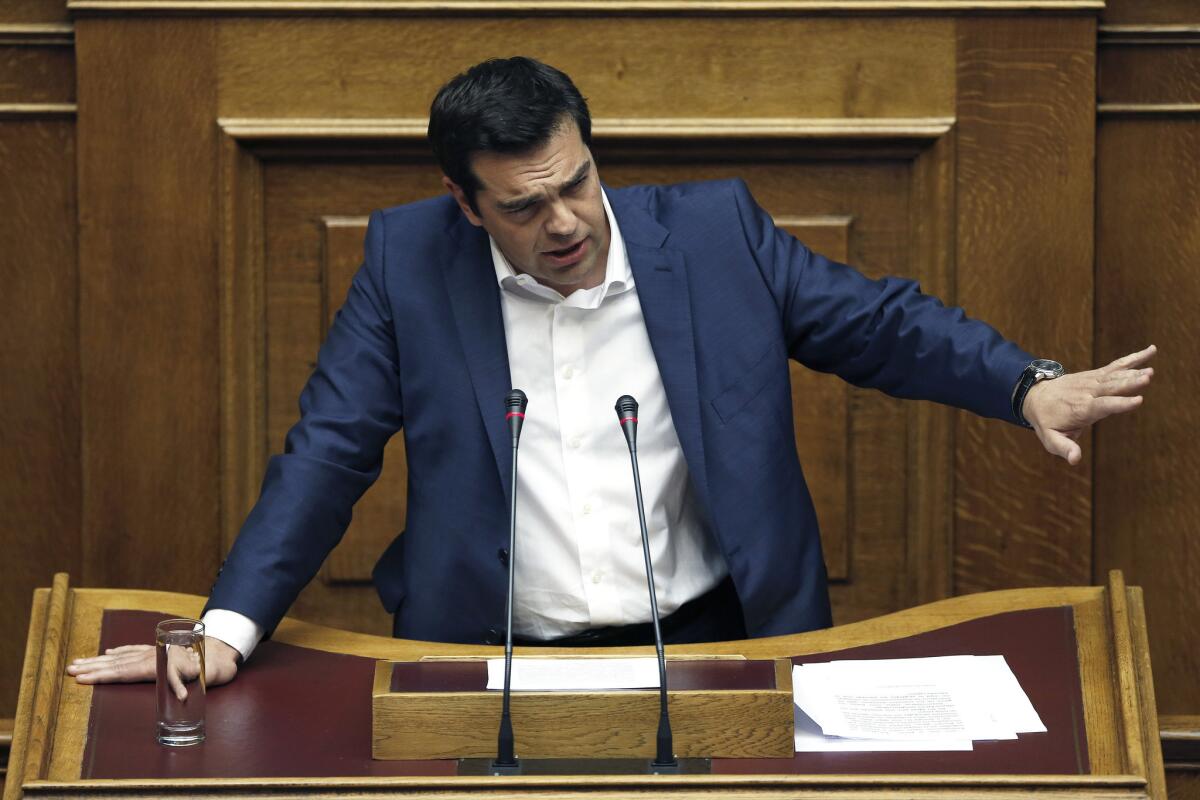Greek leader assails ‘absurd proposals’ from European creditors

Greek Prime Minister
A day after the Syriza-led Greek government acknowledged it couldn’t reach a deal with European creditors, Prime Minister Alexis Tsipras took to the airwaves to sound a defiant note on the failed talks.
In a nationally televised address to Parliament on Friday evening, Tsipras rebuffed the European Commission and the German-led creditors who hold much of Greece’s debt.
------------
FOR THE RECORD
An earlier version of this post misspelled the name of the German finance minister.
------------
“The government is not going to give in to absurd proposals,” he told lawmakers in Athens. This is “a bad negotiating trick.”
He also warned against those who would “humiliate” Greece, a reference to what many in Athens perceive as scolding treatment from the institutions and particularly German Finance Minister Wolfgang Schaeuble.
Greece is seeking a debt restructuring that would alleviate the burden of its massive financial obligations and release about $8 billion in previously agreed-upon bailout funds, in turn preventing a default and potential exit from the euro currency. The German-led creditors are refusing to meet Greece’s demands until the country makes promises of more austerity and labor reform.
Tsipras’ Syriza, however, was elected in January on a strong anti-austerity platform.
The battle has come to a head in the last few weeks owing to Greece’s June 5 deadline for a $325-million debt payment to the International Monetary Fund, a payment Greece had said it wouldn’t make.
After several days this week when it seemed like a deal between Greece and the lending institutions was at least a possibility, the talks stalled Thursday. On Thursday afternoon Tsipras’ government formally requested, and was granted, an alternate payment schedule that would give Greece several weeks to make the $325-million payment.
The request of the IMF, though rare, was a fairly straightforward way for Greece to buy more time. It did little to alleviate the underlying issue, and will now obligate Greece to write a check to the IMF in excess of $1.7 billion in total debt payments by the end of the month, also the time when the current bailout agreement will expire.
Tsipras’ pronouncements on Greek television were largely waved off by German commentators as more rhetoric from a leader who has not been shy about such statements.
Still, they underscored Tsipras’ ongoing tightrope walk.
The Greek leader has long been caught between two flanks of his party -- the more mainstream group that favors staying in the Euro, and the so-called Left Platform, the roughly 30% that is more open to an exit. Tsipras’ sharp remarks Friday were seen as an attempt to placate that wing, which has expressed concern he and Finance Minister Yanis Varoufakis will capitulate too easily to German demands.
Tsipras also held a phone call with Russian President Vladimir Putin Friday over potential energy collaborations, a gesture that was also seen as appealing to Syriza’s radical flank, which favors a shift away from Europe.
Still, Tsipras made sure to move only so far in that direction Friday. In his speech to Parliament, he also called for a “conclusive solution” for staying in the euro and also warned of an economic disaster that would become a ”self-fulfilling prophecy” if exit talks heat up.
Markets are watching the talks closely, with the prospect of a so-called Grexit reigniting fears of global contagion that began at the start of the debt crisis more than five years ago.
The nation of 11 million has been mired in a financial crisis that the ongoing debt problems have only worsened.
Tsipras has sought a line between appealing to Greeks’ national pride in resisting a deal, while also not making it seem as if German negotiations and a larger financial limbo would become a permanent condition.
Whether Greeks have felt reassured is an open question.
“There’s a feeling among the people of Greece that this has been stagnant for a long time and needs to come to a resolution soon,” said Roman Gerodimos, an expert on modern Greek affairs at Bournemouth University in England. “One way or another, there has to be some conclusion, because they feel they can’t continue with the uncertainty.”
More to Read
Start your day right
Sign up for Essential California for news, features and recommendations from the L.A. Times and beyond in your inbox six days a week.
You may occasionally receive promotional content from the Los Angeles Times.






